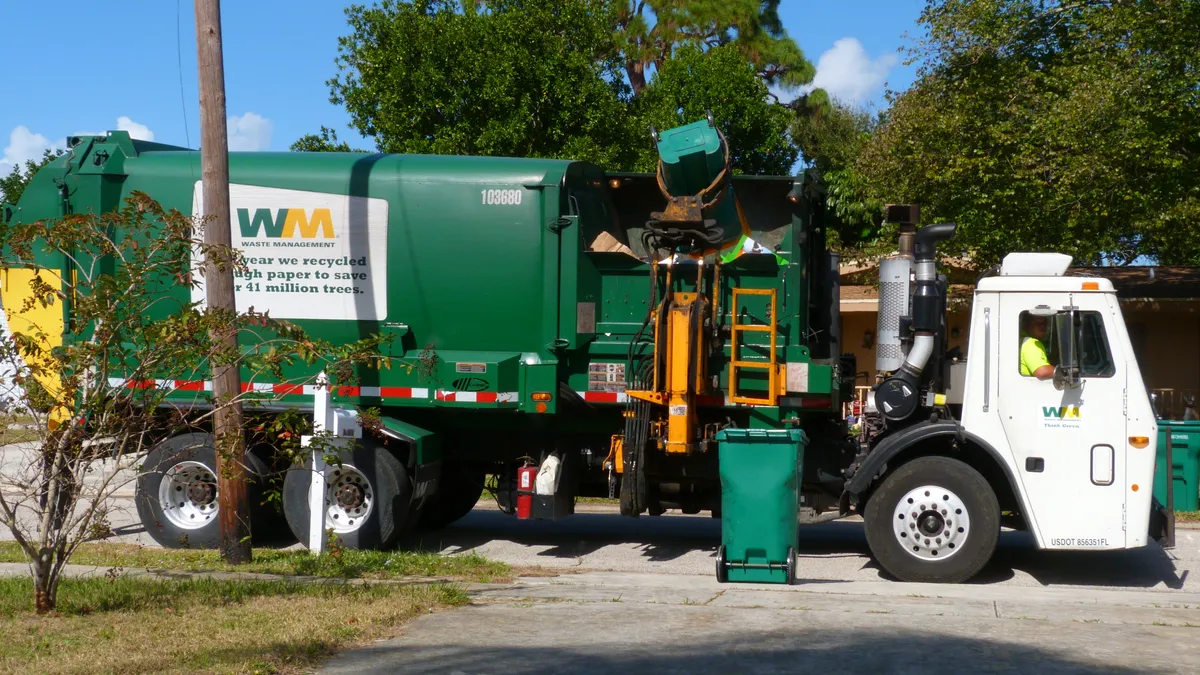Q3 Earnings
| Revenue | $3.97B |
| YoY Change | 3.92%▲ |
| Net Income | $495M |
If an economic downturn is coming, Waste Management's Q3 earnings results indicate the warnings signs aren't being reflected in container volumes just yet.
"[Results have] been particularly strong in our lines of business that are driven by the consumer portion of the economy, commercial collection and MSW landfill volumes," said CEO Jim Fish in prepared remarks during a Wednesday earnings call. "When we look at the portion of our business driven by the industrial segment of the economy — namely special waste — we continue to see growth. However, the pace of growth is starting to moderate."
Waste Management reported operating EBITDA of $1.14 billion (up by more than 3% YoY) driven by particularly notable results on its collection and disposal business. Executives attributed much of this to a running pattern of strong price growth, which they anticipate may be here to stay.
Landfill longevity
- Waste Management reported a core price of 5.3% for the quarter, based on upward movement across all sectors. Fish referred to disposal pricing as a particular "bright spot" and repeatedly described it as the "big news" for Q3. Core price was 4% for landfills and 3.1% for transfer stations.
- Given Waste Management's prime position in most major metropolitan areas, and the increasing operational costs for landfills, Fish sees plenty of potential. "I think this thing can go on for a long time ... I'm not expecting to get called in front of a Senate subcommittee any time and be asked 'why are you throwing 15% on your landfills?' It's 3.7% MSW ... It's not obscene at all, it's just really going to recovering cost and hopefully adding a little bit of margin expansion."
- The company also reported $483 million in capital expenditures across a variety of areas (including fleet upgrades) but most notably disposal sites. "When we look at ... what has driven our very proactive and intentional investments, it's been driven by the landfill line of business, where that volume growth has exceeded our expectations," said CFO Devina Rankin.
Financial analysts and commentators have been asking Waste Management for months about warnings of a potential economic downturn, but so far the company still isn't calling out any signs.
According to Fish, an estimated 70% of the company's business is tied to the consumer economy and "feels really good from both a price and volume standpoint." Waste Management even reported strong pricing for residential business, where Fish said "we've clearly had challenges moving that in the past," and outlined positive trends for industrial business.
While some large generators are reportedly taking a "wait and see" approach on big projects, certain special waste streams such as disaster debris and coal ash are seen as ongoing benefits. High volumes from California wildfire clean-ups have contributed $40 million to EBITDA for the year. For coal ash, Fish once again described it as a "big opportunity for us" and referenced increasing business with Duke Energy.
Recycling and renewables
While Waste Management's core business of waste collection, transfer and disposal continued to perform well, it was once again offset by a couple smaller (though prominent) segments. In fact, stubbornly bad returns from the company's commodity-related business have largely offset better-than-expected growth in other areas to the point that 2019 guidance remains the same.
- Waste Management's Q3 recycling revenue was $245 million, down $86 million YoY, driven by an exceptionally low average commodity price of $40 per ton. This made for a $7 million EBITDA hit, but executives claimed victory because it wasn't worse.
- While the company is now one year into starting to charge new contamination fees, and continuously renegotiating processing contracts, recycling revenues are expected to remain a headwind in 2020. Waste Management's 10-Q indicates it doesn't anticipate "material changes in market prices" even as new paper mill capacity opens. Slower global demand for cardboard, plus "retail store closures and e-commerce packaging efficiency" are cited as key factors.
- Steep declines in the value of RIN credits under the Renewable Fuel Standard — which Waste Management takes advantage of for its biogas projects — have cost $18 million in operating EBIDTA so far this year. Fish wasn't optimistic about a near-term change due to complex politics, but said "we do expect that there probably will be some resolution on this either as we approach or after the election."
Looking ahead
- Waste Management spent $218 million on dividends during Q3. The company plans to continue its suspension of stock buybacks pending the Advanced Disposal Services acquisition — aside from activity to offset share dilution from equity compensation plans — and hasn't executed any since Q2.
- The company spent $76 million on tuck-in acquisitions during Q3, bringing it to $513 million for the year so far (excluding Advanced). "Our strong balance sheet continues to afford us the financial flexibility to pursue strategic acquisitions at the right price," said Rankin.
- Aside from some discussion about ramping up financing plans, executives had no new information to share on the pending Advanced deal. "[W]e continue to work down the path with the regulators and we remain on track and feel good about our timing for Q1 of 2020," said COO John Morris. "There is nothing that we've seen to-date that would cause us to amend that timeline."















